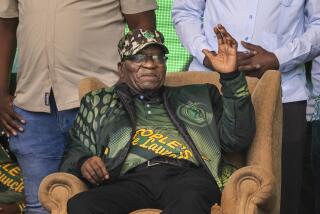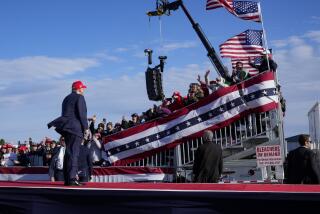2 Israeli Arabs Ask Court to Let Them Run
- Share via
JERUSALEM — A pair of Arab legislators who were declared enemies of the state and banned from running for reelection appeared before Israel’s high court Tuesday to argue for the right to campaign.
Ahmed Tibi and Azmi Bishara were accused of supporting attacks against Israel and ousted from the elections, scheduled for Jan. 28. Their banishment set off a debate over free speech and discrimination in a nation that prides itself on its democratic rule.
Israel’s election committee said Bishara, a political philosopher at Birzeit University, had praised “popular resistance” during a speech in Syria. The Balad Party member was also accused of rallying Palestinians to use the Lebanese terrorist group Hezbollah as a model for uprising.
Based on those charges and secret evidence collected by Israeli intelligence, the prolific author was accused of inciting rebellion, and he and the rest of his party were banned from the elections. Tibi, of the Arab-Jewish Hadash Party, was banned on charges of supporting terrorist organizations.
“There’s freedom of speech in Israel, but there’s no freedom to call fire in the middle of a crowded cinema,” lawyer Yoav Mani told the court in his argument for banning Bishara and his party from the parliament, or Knesset. “The damage an idea can cause goes beyond a party’s electoral power. The idea contaminates the public discourse.”
But to Arabs and civil libertarians, the Central Elections Committee’s decision was a troubling -- and undemocratic -- blow to freedom of speech.
“It’s not enough that the candidate said or says infuriating things (and almost all of the Arab members of the outgoing Knesset have said intolerable things),” political analyst Amnon Rubinstein wrote in the Israeli newspaper Haaretz. “Something more concrete is required: a possible threat to the foundations of our democratic life.”
The men were ousted under a process unveiled in the fall that allows the Central Elections Committee to disqualify candidates who support terrorism. The committee presented its argument to the Supreme Court on Tuesday, and the panel is expected to decide by Thursday whether to uphold the bans.
Some Arabs have accused the government of making an example of the lawmakers to demonstrate it is taking a tough stance against Palestinian extremism. In the final weeks before voters go to the polls, the case has roiled Israel’s political scene.
When State Department spokesman Richard Boucher said the United States wants to see “broad participation” in the Israeli elections, the remark was understood here as an indirect slap at the banning of the Arabs.
“It’s a political move, not a security move as they say,” said Marwan Dalal, a lawyer for the two ousted lawmakers. “It’s a clear attempt to limit political speech. These are Palestinians asserting their right to self-determination and to resist the occupation. This is annoying for the Israeli government.”
The more than 1 million Israeli Arabs represent a little less than one-fifth of the population. Some Arabs accuse Israel of using the bans to curb Arab participation in the elections, and leaders are already planning their response in the event the court upholds the decisions. Some want Arabs to boycott the elections in protest; others will urge their followers to vote en masse.
In his speech to the court, a lawyer for the attorney general said the Balad Party must be banished because it is fighting for “a state for all citizens.”
“Balad believes that any law that gives preference to Jews should be annulled,” Talia Sasson said. “Its goal is to create a state for all its citizens, a state which negates Israel’s existence as a Jewish state.”
But lawyer Hassam Jabareem told the court that the accusations against Bishara were “completely without grounds.” Bishara has never denied the right of the Jews to exist and has said repeatedly that civilians should not be hurt, his lawyer argued.
“He does not conceal his view against occupation and intifada,” Jabareem said. “Don’t ask the Arab [members of the Knesset] to become active Zionists, because they’re not.”
Meanwhile, on the sun-bleached streets outside the court, hundreds of Israelis -- Arabs and Jews -- waved Palestinian banners, chanted resistance slogans and held up signs reading “Ethnic cleansing in the Knesset” and “Racist democracy.”
On the opposite sidewalk, New York-born emigre Shifra Hoffman stood with a cluster of Jewish demonstrators, shaking her head over the “soul-sick leftists” across the street. “1127 Israelis murdered since Oslo. Our brothers’ blood is crying out,” read a banner strung before the group.
“No normal country in the world allows its enemies to sit on its parliament,” said Hoffman, head of an organization called Victims of Arab Terror. “And I don’t want to live in a state where the enemy is allowed to vote. That doesn’t mean minorities don’t have rights. They do, but not to vote.”
More to Read
Sign up for Essential California
The most important California stories and recommendations in your inbox every morning.
You may occasionally receive promotional content from the Los Angeles Times.













